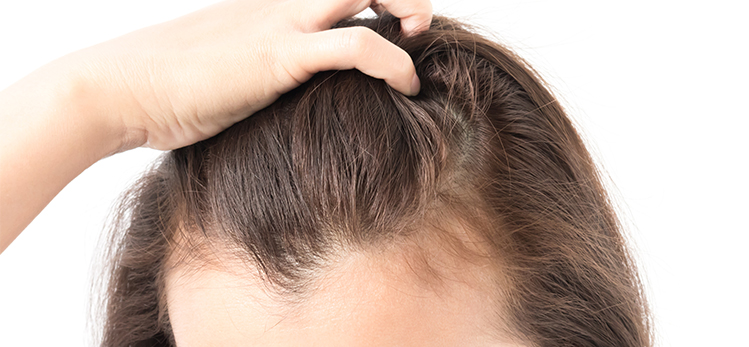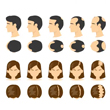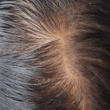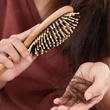Green Tea For Hair - Everything You Need To Know
Green tea has been a trendy beverage for its weight-loss capabilities. However, it is little known that it is beneficial in many other ways as well. Its health benefits are currently being studied and are even being tested to show positive signs for some forms of cancer. They are rich in antioxidants and other minerals.

Some recent studies have shown positive results on its ability to treat hair loss. The studies suggest that green tea for hair fall may circumvent it by providing the necessary nutrients required for its growth.
What is Green Tea?
Green tea is acquired from the extracts of Camellia sinensis - a plant that is enriched in healing properties. People usually drink it early in the morning or in the evening to treat weight loss and digestive problems. In terms of flavor, it is entirely tasteless and often accompanied by honey, ginger, or other ingredients. Brewed green tea is water-based and doesn’t contain any fat. Hence, it is safe to be consumed at regular intervals.
How Beneficial is Green Tea for Hair Fall?
Several factors contribute to hair fall and vary from person to person. These factors include autoimmune diseases like alopecia , hormonal changes, stress, anxiety, or diet changes. Apart from that, genetics play an essential role as well. It determines the health and condition of hair follicles that determine the growth of hair.
On the other hand, green tea is advertised as a ‘cure’ to prevent various health risks and diseases. It is rich in antioxidants that come from compounds called flavonols. Here, green tea has a particular type of flavonol known as catechins. The most potent catechin present in green tea is Epigallocatechin Gallate or EGCG. This has been linked to reducing heart disease and certain types of cancer in some people.
Recently, a study was conducted involving two groups of rodents. The first group was given polyphenol extracts from dehydrated green tea mixed in their water. The second group was assigned normal drinking water, and both the groups were given the same diet. At the end of the study, 33% of the rodents belonging to the first group significantly increased hair growth . On the other hand, no rodents from the second group showed any growth of hair.
The problem with the previous study was that it had not been tested on humans yet. However, newer studies may emerge after the writing of this post to better support the claim. Due to rodents sharing most DNA with humans, green tea is recommended for better hair and health.
Here are a few reasons why research suggests green tea for hair fall.
Stimulates Hair Follicles
As mentioned earlier, EGCG present in green tea may help with hair growth. For the most part, hair growth is attributed to the condition of hair follicles. Hence, the proper nutrients must be present in the body to keep it healthy. Therefore, using green tea for hair fall helps provide the necessary nutrients that are good for both the body and hair follicles. These nutrients help to improve the health of the scalp as well.
Green Tea Helps to Regrow Hairs
Hormonal changes involving testosterone and dihydrotestosterone (DHT) are one of the common causes of hair loss . The polyphenol compounds, EGCG, present in green tea helps to minimize the effect of these hormones and maintain hair growth. In turn, it slows down the shedding of hair while regulating its development.
How to Use Green Tea for Hair Fall?
The easiest way to take green tea is to drink it orally. There are many recipes to make the drink according to taste and liking. Never try to take green tea supplements as they may be more harmful than helpful. Some other ways to use green tea is by the following ways -
Shampoo & Conditioner - Some brands of shampoos and conditioners contain green tea extracts. Similar to everyday use, apply the products to the roots and scrub the scalp gently. Do not forget to apply it to hair shafts and tips as well. Rinse once done and do this periodically.
Rinse hair with green tea - Use 2-3 green tea bags and brew them in half a liter of water for 10 minutes. After that, let the liquid cool for a while and wash your hair with normal water. Then, use the liquid to massage the scalp and roots of the hair. Finally, rinse it off with normal water again and repeat it once or twice a week.
Conclusion
To summarize, certain studies have proved beneficial in favor of green tea for hair fall. The antioxidants and EGCG present in the world’s favorite drink may positively affect hair growth. However, more studies are required to test its efficacy in a large sample group for concrete results. Despite that, drinking green tea accounts for various other health benefits and is recommended for treating hair fall.
Myth Busters HairFall

Androgenetic Alopecia - Everything You Need To Know
Have you been experiencing excessive hair fall over a prolonged period of time? It could be an early sign of androgenetic alopecia. It is a hair loss disorder common in both genders and can lead to progressive thinning and even baldness in some patients if not caught and treated early.

How To Make Hair Grow Faster For Men
A head full of healthy hair is a matter of confidence. Hair has its own mechanism of growing and shedding, and it is when this mechanism is thrown off that growth is hindered. Especially in the case of males, hair growth faces a lot of hiccups that can easily be managed.

Female Pattern Baldness - Causes & Treatments
Have you suddenly noticed an increase in the number of hair strands on your pillow in the morning? Or is your ponytail getting thinner by day? Well, you might be suffering from female pattern baldness. While that does sound scary, identifying it early on is key to treating this condition effectively. So keep reading to know what this is, how you can identify it, and most importantly, what treatments you can avail of to get your beautiful lustrous hair back.

What Are The Reasons For Hairfall?
Almost everyone experiences some amount of hair thinning over the years. Shedding around 50 to 100 single strands of hair per day is considered normal. However, losing more than 150 strands a day, experiencing sudden thinning, or developing circular bald patches on your scalp are reasons for concern. Hair loss occurs when new hair doesn’t grow fast enough to replace the amount of hair you lose daily. Hair can fall due to various reasons, with hereditary hair loss and poor nutrition being the most common hair fall reasons.

Expert Approved Tips For Hair Growth
What can be more debilitating than seeing hundreds of hair strands shedding from your scalp every time you brush your hair? Also, excessive molting occurs during seasonal changes that can be very stressful for you. Although it’s okay to lose between 50-100 strands every day, according to the American Academy of Dermatology, the problem occurs when you start shedding more than normal. But that doesn’t mean you have to feel helpless as there are ways to grow your hair back. Even if you are coping with baldness or alopecia, certain hair growth tips from dermatologists can come to your rescue. Read on to discover how these tips can be your savior when abnormal hair fall problems are in sight.
Trending Videos
+ 6 Sources
LMRC - GGI-CO-A2-DMA-300026127-300026127-WM-J21-282
© 2021 Dr. Reddy’s Laboratories Ltd. All rights reserved.